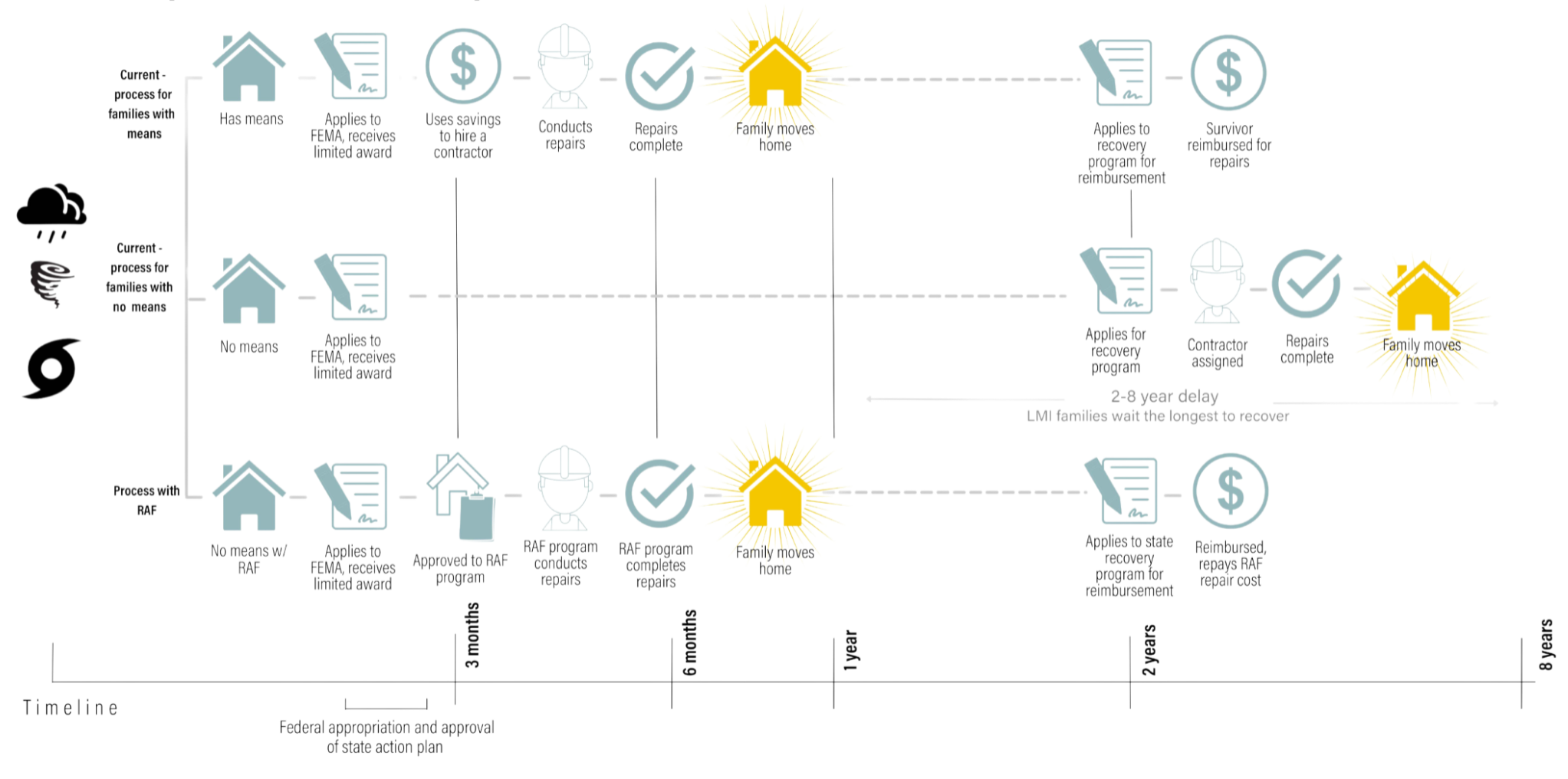RECOVERY ACCELERATION FUND
Federal Disaster Assistance for permanent repairs to low and moderate-income homes is typically provided through the Department of Housing and Urban Development's (HUD) Community Development Block Grants for Disaster Recovery (CDBG-DR). On average, it takes 24 to 30 months before these funds appear in devastated communities, forcing millions of Americans to wait years before returning safely to their homes. Delays in disaster assistance disproportionately impact low-to-moderate-income families, strain adjacent social services, and erode community ties in the early days of recovery.
Many state and local CDBG-DR programs include a HUD-approved "reimbursement" pathway that reimburses qualified homeowners for eligible home repair expenses. Under this approach, homeowners spend their own funds or savings to restore their homes, save receipts for the repairs, and apply for reimbursement when CDBG-DR funds become available months or years later. However, this solution only works for those who have funds to make repairs out-of-pocket.
Solution - SBP’s Recovery Acceleration Fund (RAF) is a social impact investment fund that aims to rebuild for the most vulnerable HUD-qualified homeowners. RAF allows the widely-utilized HUD-approved reimbursement pathway to assist families who do not have funds to repair their homes. Private, institutional, and charitable funds are being pooled to finance immediate home repairs for survivors who will qualify for federal assistance when it arrives but cannot finance repairs to their homes today.
This approach offers many benefits:
RAF allows the most vulnerable survivors to return home sooner (months vs. 2+ years of uncertainty)
Preserves affordable housing by safely and quickly returning families to (and restoring equity in) the homes they already own
RAF will reduce average repairs costs by repairing homes sooner and avoiding further damage from disrepair
RAF loans do not duplicate other disaster benefits
SBP's ultimate goal is that the RAF model will become the rule - not the exception - to bridge the gap in the national structure for long-term disaster recovery for low-income homeowners.
Need Help? Call 863-660-3133
Eligibility
To be eligible for assistance through the Florida: Recovery Acceleration Fund, clients must meet the following criteria:
Owned the home in need of repairs at the time of the storm and maintained ownership to the present day.
Occupied the home as your primary residence at the time of Hurricane Ian. (September 28th, 2022).
The home is located within one of the FEMA Individual Assistance declared parishes for Hurricane Ida.
Have a household income at or below 50% Area Median Income.
Applied for and received Home Repair assistance from FEMA.
The home has not been declared substantially damaged by the local floodplain administrator.
BRING RAF TO YOUR COMMUNITY
SBP partners with corporate leaders, nonprofits, and other stakeholders to develop and advocate for solutions that address the inherent inequities and inefficiencies of the nation’s disaster preparedness and recovery system. As an innovative solution that has the ability to quickly leverage funds, the Recovery Acceleration Fund serves as a replicable, scalable model that promotes more prompt and predictable recoveries and financial stability for low-income disaster survivors.
If you are an elected official or community or NGO leader that serves disaster-impacted survivors and would like to discuss how to bring RAF to your community or to qualify your clients for the Recovery Acceleration Fund where possible, please contact Reese May – SBP's Chief Strategy & Innovation Officer.
If you are interested in learning more about or investing in the Recovery Acceleration Fund, please contact Keith McCulloch - SBP's Chief Financial Officer.
RAF Process vs. Current Process

